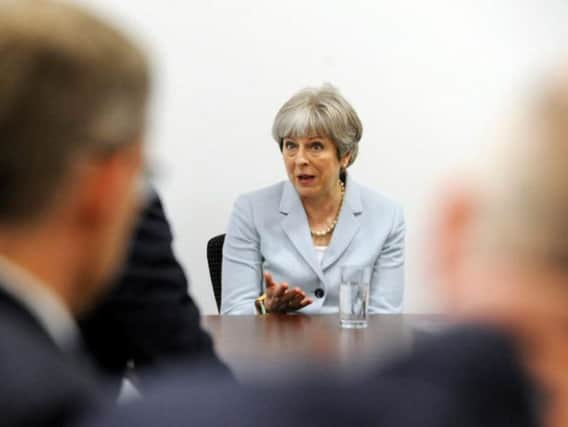Theresa May defends role in trebling tuition fees as she launches review of 'one of world's most expensive systems'


Mrs May was Home Secretary in December 2010 and the then-Cabinet Minister voted in favour of a policy to increase tuition fees to a maximum of £9,000-per-year. The vast majority of courses now cost the current annual maximum of £9,250.
In launching a major review of how post-18 education works in this country, Mrs May said in a speech in Derby yesterday afternoon: “The competitive market between universities which the system of variable tuition fees envisaged has simply not emerged.
Advertisement
Hide AdAdvertisement
Hide Ad“The level of fees do not relate to the quality or cost of the course. We now have one of the most expensive systems of university tuition in the world.”
But when asked by The Yorkshire Post hours later whether the 2010 decision had been a mistake, she said the policy had allowed more people to attend university than had previously been the case.
“There are lots of things about the current system that work well,” she said.
“We took the decision in 2010 in the circumstances at the time and the system that was put in place has delivered a number of advantages in the higher education sector. We do see more people from disadvantaged backgrounds going to university, we do see more students going to university. Being able to take the cap off was a crucial part of that.
Advertisement
Hide AdAdvertisement
Hide Ad“But now we want to look across the system - because I recognise the concerns that students themselves but also their parents and their grandparents have about levels of debt - to make sure we have got the balance and it is a system that is fair for students and fair for taxpayers.
“What we want to do is say how can we improve the system, how can we make sure in terms of the financing and funding we do see people from every background be able to go to university? We do have more people from disadvantaged backgrounds going to university today but we just want to make sure the system that enables people to go.”
Mrs May said the review was intended to be wider than the issue of tuition fees.
“What we need to is look across the whole question of education post-18 and say have we got the system right? I think there is an expectation of university when it is not right for everybody.
Advertisement
Hide AdAdvertisement
Hide Ad“We want to make sure other routes like apprenticeships and technical education are there but also are valued. If somebody says, ‘I’m going to be an apprentice’, everybody says that is a great thing to do.”
The review, which will be led by finance expert and author Philip Augar and is expected to take around a year, will focus on four key questions, Mrs May said: ensuring education is accessible to all, the funding system, encouraging choice and competition and providing the skills the country needs.
According to estimates by the Institute for Fiscal Studies (IFS), the average student can now leave university owing more than £50,000.
The debate over university finance was initially sparked in part by a Labour Party election pledge to scrap tuition fees for future students.
Advertisement
Hide AdAdvertisement
Hide AdBut Mrs May said it is right that students contribute to the cost of their education.
“I believe – as do most people, including students – that those who benefit directly from higher education should contribute directly towards the cost of it,” she said. “That is only fair.”
Shifting the burden of university tuition onto the taxpayer would mean tax increases for the majority of people who did not go to university, leave universities competing with schools and hospitals for funding and lead to the re-introduction of a cap on student numbers, Mrs May argued.
Labour describes review as 'waste of time'
Labour has claimed the education review ordered by Theresa May is an “unnecessary waste of time”.
Advertisement
Hide AdAdvertisement
Hide AdShadow education secretary Angela Rayner said: “Labour will abolish tuition fees, bring back maintenance grants and provide free, lifelong education in further education colleges.”
Nick Hillman, director of the Higher Education Policy Institute, said the review team has “enormous expectations on their shoulders”.
“People want them to reduce tuition fees for some or all courses, lower the interest rate on student loans, bring back maintenance grants, help part-time and mature learners and bolster further education colleges. It will be hard to satisfy all the hopes.”